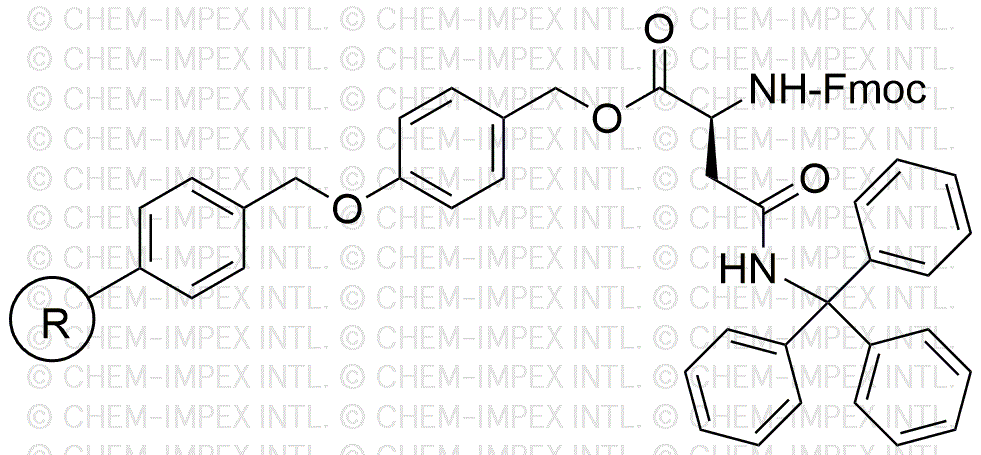Na-Fmoc-Ng-trityl-L-asparagine 4-alkoxybenzyl alcohol is widely utilized in research focused on:
- Peptide Synthesis: This compound serves as a key building block in the synthesis of peptides, enabling researchers to create complex proteins for various studies.
- Drug Development: It is used in the development of pharmaceutical compounds, particularly in creating targeted therapies that can improve treatment efficacy.
- Bioconjugation: The chemical is valuable in bioconjugation processes, allowing for the attachment of biomolecules to therapeutic agents, enhancing their delivery and effectiveness.
- Research in Neuroscience: It plays a role in synthesizing neuropeptides, which are crucial for understanding neurological functions and disorders.
- Custom Synthesis Services: Many research labs utilize this compound for custom synthesis, providing tailored solutions for specific experimental needs.
Información general
Propiedades
Seguridad y normativas
Aplicaciones
Na-Fmoc-Ng-trityl-L-asparagine 4-alkoxybenzyl alcohol is widely utilized in research focused on:
- Peptide Synthesis: This compound serves as a key building block in the synthesis of peptides, enabling researchers to create complex proteins for various studies.
- Drug Development: It is used in the development of pharmaceutical compounds, particularly in creating targeted therapies that can improve treatment efficacy.
- Bioconjugation: The chemical is valuable in bioconjugation processes, allowing for the attachment of biomolecules to therapeutic agents, enhancing their delivery and effectiveness.
- Research in Neuroscience: It plays a role in synthesizing neuropeptides, which are crucial for understanding neurological functions and disorders.
- Custom Synthesis Services: Many research labs utilize this compound for custom synthesis, providing tailored solutions for specific experimental needs.
Documentos
Hojas de datos de seguridad (HDS)
La SDS proporciona información de seguridad completa sobre la manipulación, el almacenamiento y la eliminación del producto.
Especificación del producto (PS)
La PS proporciona un desglose completo de las propiedades del producto, incluida la composición química, el estado físico, la pureza y los requisitos de almacenamiento. También detalla los rangos de calidad aceptables y las aplicaciones previstas del producto.
Certificados de análisis (COA)
Busque certificados de análisis (COA) ingresando el número de lote del producto. Los números de lote y de partida se pueden encontrar en la etiqueta de un producto después de las palabras "Lote" o "Lote".
Número de catálogo
Número de lote/lote
Certificados de origen (COO)
Este certificado de origen confirma el país en el que se fabricó el producto y también detalla los materiales y componentes utilizados en él y si se deriva de fuentes naturales, sintéticas u otras fuentes específicas. Este certificado puede ser necesario para cumplir con las normativas aduaneras, comerciales y regulatorias.
Número de catálogo
Número de lote/lote
Hojas de datos de seguridad (HDS)
La SDS proporciona información de seguridad completa sobre la manipulación, el almacenamiento y la eliminación del producto.
DownloadEspecificación del producto (PS)
La PS proporciona un desglose completo de las propiedades del producto, incluida la composición química, el estado físico, la pureza y los requisitos de almacenamiento. También detalla los rangos de calidad aceptables y las aplicaciones previstas del producto.
DownloadCertificados de análisis (COA)
Busque certificados de análisis (COA) ingresando el número de lote del producto. Los números de lote y de partida se pueden encontrar en la etiqueta de un producto después de las palabras "Lote" o "Lote".
Número de catálogo
Número de lote/lote
Certificados de origen (COO)
Este certificado de origen confirma el país en el que se fabricó el producto y también detalla los materiales y componentes utilizados en él y si se deriva de fuentes naturales, sintéticas u otras fuentes específicas. Este certificado puede ser necesario para cumplir con las normativas aduaneras, comerciales y regulatorias.


